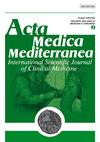Could We Use Vital Signs and Lactate Levels Together to Predict the Prognosis in Abdominal Pain?
IF 0.3
4区 医学
Q4 Medicine
引用次数: 1
Abstract
Objectives: Abdominal pain occupies most of the emergency department admissions. This entity leads to research various markers for the early detection of causes in patients presenting with abdominal pain. There is limited data about collaborations between lactate levels and vital signs at admission in abdominal pain. Materials and Methods: Patients aged 18 years and older, who had presented with abdominal pain to the Emergency Department, in total 102 patients, were included to the study. The patients’ demographics, vital signs, abdominal physical examination findings, diagnosis and outcomes of patients were recorded. The 1 ml venous blood samples were collected by blood gase injectors from the patients and lactate levels were analyzed. Results: Female patients’ percentile was 68,6% and mean age was 39 years old. The systolic blood pressure levels were normal in 45 patients, low in 26% patients and high in 29% patients. The seventy-six of the patients had normal pulse rate and 26 of them were tachycardic. Most common diagnosis was non-specific abdominal pain (37,25%) and the least common was ovarian torsion/intracystic hemorrhage (0,98%) and obstruction due to hernia (0,98%). There was no statistically significant relation between lactate level and pulse rate (p=0,637), systolic blood pressure (p=0,052), diastolic blood pressure (p=0,095), respiratory rate (p=0,527), body temperature (p=0,040) and oxygen saturation (p=0,905). Similarly, no significant association occurred between lactate levels and diagnosis and outcomes. Conclusion: Further studies including more patients groups have to be done in order to attain more reliable data about this topic.生命体征和乳酸水平能否共同预测腹痛的预后?
目的:腹痛占急诊科住院病人的大部分。这个实体导致研究各种标志物的早期发现的原因,在病人呈现腹痛。关于腹痛患者入院时乳酸水平与生命体征之间的合作关系的数据有限。材料与方法:本研究纳入了102例年龄在18岁及以上的急诊科腹痛患者。记录患者的人口学特征、生命体征、腹部体格检查结果、诊断及转归。采用血气注射器采集患者1 ml静脉血,分析乳酸水平。结果:女性患者百分位数为68.6%,平均年龄39岁。45例患者收缩压正常,26%患者收缩压低,29%患者收缩压高。76例患者脉搏正常,26例心动过速。最常见的诊断是非特异性腹痛(37.25%),最不常见的诊断是卵巢扭转/囊内出血(0.98%)和疝气梗阻(0.98%)。乳酸水平与脉搏率(p=0,637)、收缩压(p=0,052)、舒张压(p=0,095)、呼吸率(p=0,527)、体温(p=0,040)、血氧饱和度(p=0,905)无统计学意义。同样,乳酸水平与诊断和预后之间没有显著关联。结论:为了获得关于该主题的更可靠的数据,必须进行包括更多患者组的进一步研究。
本文章由计算机程序翻译,如有差异,请以英文原文为准。
求助全文
约1分钟内获得全文
求助全文
来源期刊

Acta Medica Mediterranea
医学-医学:内科
自引率
0.00%
发文量
0
审稿时长
6-12 weeks
期刊介绍:
Acta Medica Mediterranea is an indipendent, international, English-language, peer-reviewed journal, online and open-access, designed for internists and phisicians.
The journal publishes a variety of manuscript types, including review articles, original research, case reports and letters to the editor.
 求助内容:
求助内容: 应助结果提醒方式:
应助结果提醒方式:


